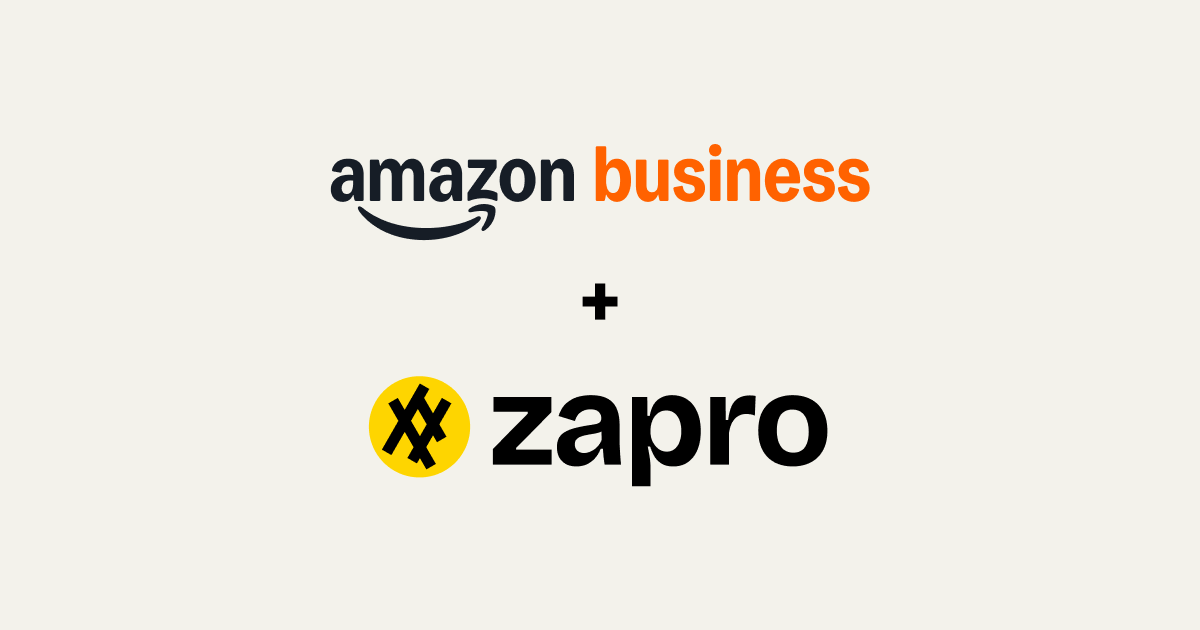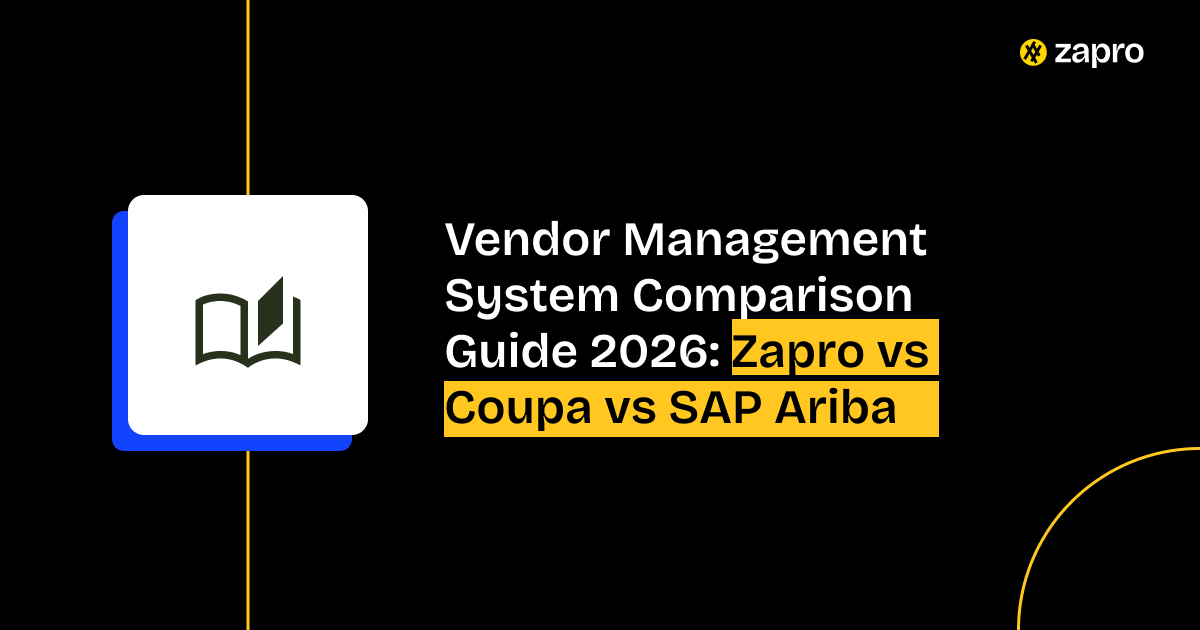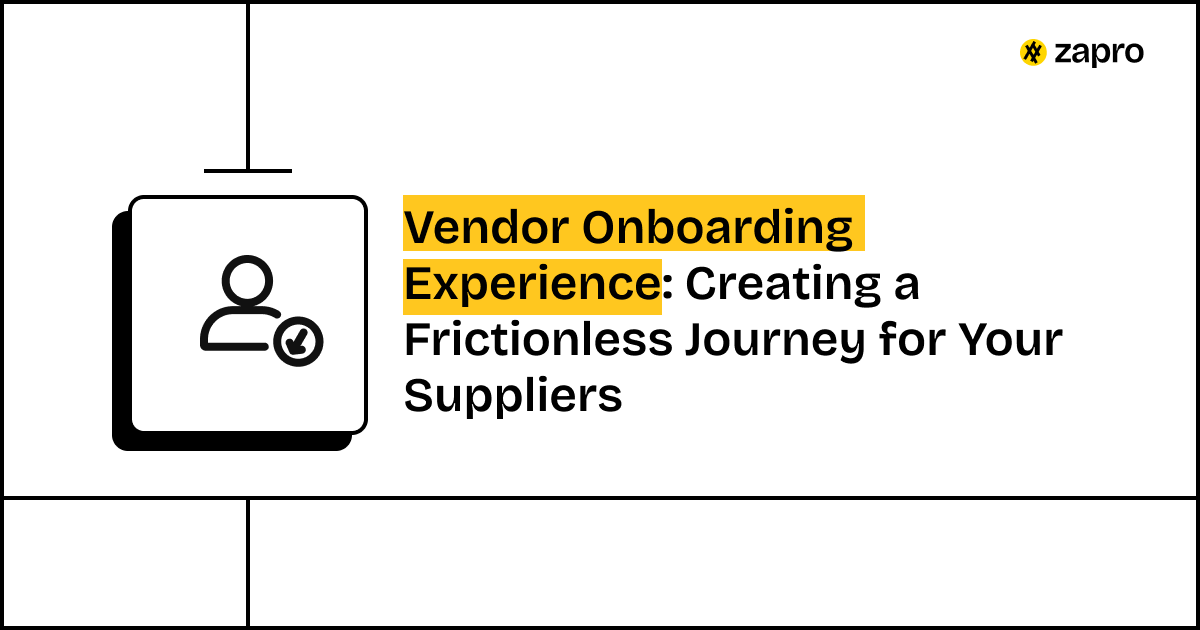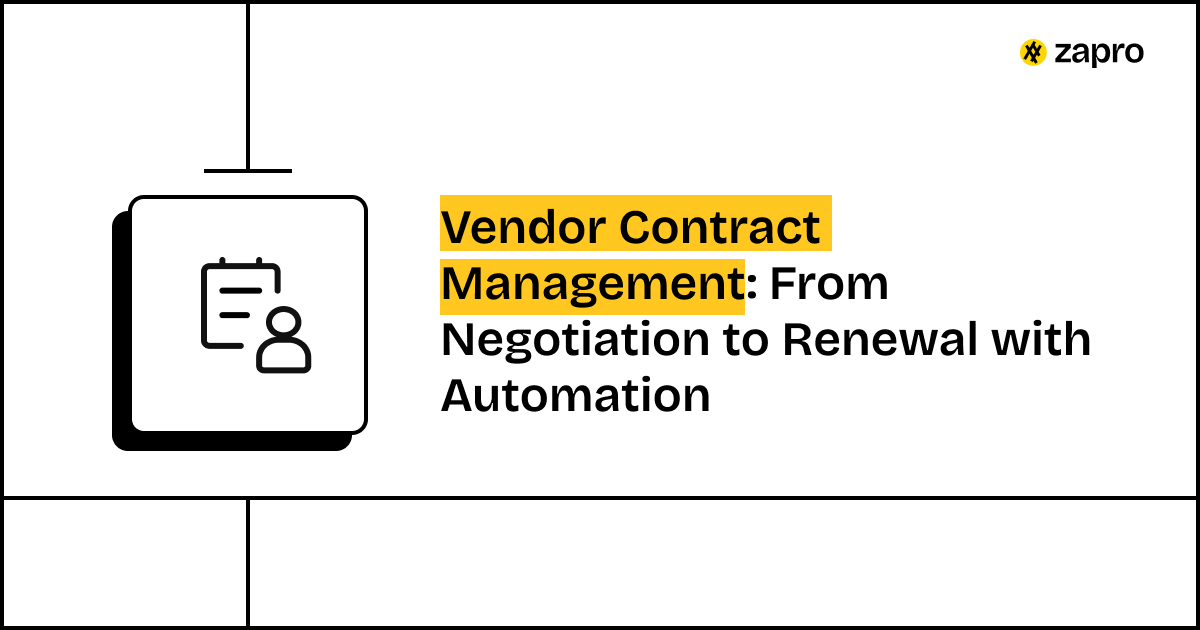Business success in 2026 depends heavily on vendor management operations. Organizations must handle their procurement operations more efficiently while reducing expenses and maintaining regulatory compliance through their complex worldwide supply networks. A well-implemented vendor management system enables organizations to optimize their purchasing operations and build better supplier connections and minimize risks and drive sustainable business expansion.
A Vendor Management System (VMS) enables organizations to achieve their goals through its effective implementation. A VMS enables teams to stay competitive through its centralized supplier data management and automated workflow processing and real-time procurement life cycle monitoring.
Companies without a vendor management system experience delayed onboarding processes and inadequate communication and restricted analytics capabilities and non-compliance issues.
The three market leaders for 2026 include Zapro and Coupa and SAP Ariba.
Zapro leads the market through its AI-based procurement automation capabilities while Coupa excels at spend management and SAP Ariba provides extensive enterprise-level solutions.
The following evaluation assesses these three platforms to determine which solution matches your organization’s requirements best.
Why selecting an appropriate vendor management system remains crucial for businesses
A business must choose the correct vendor management system because it determines operational efficiency and cost management and regulatory compliance in today’s competitive market.
1. Enhances operational performance while maintaining regulatory requirements
The system simplifies supplier onboarding and approval management and purchase order tracking which reduces manual work and enhances compliance and decreases expenses.
2. Resolves typical business problems that organizations encounter
Businesses without a solid VMS experience problems with supplier data management and delayed approval processes and non-compliance issues and restricted supply chain visibility and increased disruptions.
3. Enables complete procure-to-pay operations through real-time analytics and AI-driven insights and seamless ERP connectivity
The modern procurement leader requires complete solutions which provide immediate analytics and artificial intelligence-based insights and seamless integration with Enterprise Resource Planning systems.
4. Maintains adaptability to changing organizational requirements
Organizations must now consider sustainability alongside supplier risk management and scalability when making vendor management decisions.
5. Produces strategic business results
The selection of an appropriate VMS system provides operational benefits which lead to business growth and improved market competitiveness while building organizational resilience.

The vendor management software market size reached USD 10.40 billion in 2025 and is projected to grow with a 10.52 % CAGR through 2030.
Zapro vs Coupa vs SAP Ariba – What is the difference?
The evaluation of vendor management systems requires knowledge about how leading platforms position themselves in the market and what capabilities they offer.
The 2025 market features three leading vendor management systems which include Zapro and Coupa and SAP Ariba.
1. Zapro
The AI-powered vendor management and procurement platform Zapro serves businesses at all levels including fast-growing companies and large enterprises.
The platform can enable no-code workflow automation for sourcing and approval processes and supplier onboarding while it can also maintain seamless connections to ERP and accounting systems. The system will also provide real-time analytics for your teams that can help your teams monitor suppliers and optimize their procurement operations.
2. Coupa
The spend management platform Coupa attracts businesses of all sizes from mid-enterprises to large organizations. The unified cloud platform of Coupa delivers complete procurement process visibility through its combination of analytics power and robust supplier portals and strong compliance tools. The wide range of integrations and broad partner network of Coupa makes it the top choice for organizations seeking to optimize their spending across different categories and geographic areas.
3. SAP Ariba
SAP Ariba provides enterprise-level procurement solutions which support large-scale complex procurement operations. The platform delivers complete source-to-pay automation alongside advanced compliance features and analytical tools for supplier risk assessment and cost optimization.
The worldwide presence and seamless integration with ERP systems particularly for SAP environments make Ariba the preferred choice for multinational corporations that want to transform their procurement operations.
Vendor management system feature comparison: Zapro vs Coupa vs SAP Ariba
| Feature | Zapro (AI-driven workflows) | Coupa (Spend management platform) | SAP Ariba (Enterprise procurement) |
| Best For | SMEs & fast-growing enterprises | Mid-sized to large enterprises | Global enterprises & complex supply chains |
| Deployment | Cloud-based, no-code workflows | Cloud-based, unified platform | Cloud-based, SAP-native, highly scalable |
| AI & Automation | Advanced AI-driven procurement automation | Limited AI; strong process automation | Predictive analytics & AI for risk management |
| Supplier Onboarding | Fast, simplified, no-code onboarding | Moderate complexity; robust supplier portal | Comprehensive but complex onboarding process |
| Spend Analytics | Real-time insights with intuitive dashboards | Strong spend visibility & benchmarking | Enterprise-level analytics & compliance tools |
| Integrations | API-friendly, ERP/accounting ready | Extensive ERP and 3rd-party ecosystem | Deep ERP integration, best with SAP systems |
| Pricing Model | Transparent, flexible, SME-friendly | Subscription-based, typically higher TCO | Enterprise-level, custom pricing |
Platform-by-platform analysis of leading procurement software: Zapro vs Coupa vs SAP Ariba
The evaluation of leading procurement software platforms includes Zapro against Coupa and SAP Ariba.
The choice of vendor management system depends on how well the system matches your:
- Business size
- Growth plans
- Organizational priorities
The following evaluation examines Zapro, Coupa, and SAP Ariba through their distinct advantages, constraints, and suitable business applications.
1. Zapro vendor management system
- USP: AI-driven procurement automation
- Best for: SMEs and growing businesses
Strengths
- Provides fast supplier onboarding and no-code workflow setup.
- Easy-to-use interface compared to other platforms.
- AI-based automation systems provide SMEs with enterprise-level spend analytics through real-time data.
- Simple connections between ERP systems and accounting platforms enable synchronization between finance and procurement teams.
Limitations
- Lacks advanced customization options which SAP Ariba provides to organizations with complex supply chains.
See Why Companies Are Choosing Zapro

2. Coupa procurement software
- USP: Comprehensive spend management
- Best for: Mid-sized to large enterprises
Strengths
- Enables complete spend visibility through advanced analytics and benchmarking tools.
- Provides strong compliance tools and supplier risk management features.
- Offers extensive connections to ERP systems and third-party applications.
- A wide partner network supports procurement optimization across categories and regions.
Limitations
- Advanced features are complex, requiring users to invest time in learning.
- Subscription model and high total cost of ownership (TCO) can be prohibitive for SMEs and budget-conscious organizations.
3. SAP Ariba vendor management solution
- USP: Enterprise procurement powerhouse
- Best for: Global corporations and complex supplier networks
Strengths
- Provides excellent scalability with the help of deep integration with ERP systems, particularly in SAP environments.
- Very much suitable for multinational companies with very big vendor networks.
- It also includes advanced risk prediction analytics, supplier collaboration tools, and robust compliance features.
Limitations
- Requires a very extensive IT support for implementation because of prolonged and complicated setup.
- Enterprise-level pricing prevents smaller organizations from accessing its features.
Zapro vs Coupa vs SAP Ariba: Pricing and Deployment Comparison
The evaluation process for vendor management systems depends heavily on pricing structures and deployment options.
Businesses must evaluate:
- Total cost of ownership (TCO)
- Implementation duration
- Scalability potential
in addition to system features when selecting a vendor management system. The 2025 market analysis shows Zapro, Coupa, and SAP Ariba have different pricing structures and deployment methods.
1. Zapro vendor management system pricing
Key Points
- Provides a very adaptable pricing also because it primarily matches the needs of small to medium-sized enterprises and expanding businesses.
- Subscription plans include all costs, enabling accurate financial planning.
- No-code setup enables businesses to deploy the system within weeks instead of months.
Pricing
- Starts at $500 per month
- Scales up to $1500 per month based on user numbers and selected modules.
2. Coupa procurement software pricing
Key Points
- Subscription-based pricing model comes with a higher cost compared to other options.
- Provides complete spend management capabilities with extensive integration options.
- Organizations face higher TCO due to configuration work and required training programs, especially for large teams.
Pricing
- Starts at $3000 per month
- Extends to $10000+ per month depending on company size and selected modules.
3. SAP Ariba vendor management solution pricing
Key Points
- Enterprise-level customized pricing solutions designed for worldwide businesses.
- Pricing depends on selected modules and the number of transactions processed.
- Deployment is lengthy due to ERP system integration and global compliance requirements.
Pricing
- Large-scale deployments cost around $250,000 per year
- Requires customized pricing quotes.
Pros and cons of vendor management systems: Zapro vs Coupa vs SAP Ariba
A) Zapro vendor management system
Pros
- Cost-effective and transparent pricing tailored for SMEs
- Fast, no-code deployment with minimal IT support
- Intuitive UI and simple workflows for quick adoption
- Advanced AI automation and real-time spend analytics
- Seamless ERP and accounting integrations
- Flexible enough to scale from small to mid-market businesses
Cons
- Limited global supplier network compared to larger platforms
- Fewer enterprise-grade customizations for complex operations
- Lower brand recognition than long-established competitors
B) Coupa procurement software
Pros
- Comprehensive spend management and visibility
- Robust analytics and benchmarking tools
- Strong compliance features and supplier risk insight
- Extensive ERP and third-party integrations
- Large global customer base and partner ecosystem
- Supplier portal and marketplace enhance collaboration
Cons
- Higher total cost of ownership (subscription + add-ons)
- Steep learning curve for new users
- Implementation requires more training and resources
- Less agile for SMEs with limited budgets
C) SAP Ariba vendor management solution
Pros
- Enterprise-grade scalability for global corporations
- Deep ERP integration, especially within SAP environments
- End-to-end source-to-pay automation
- Strong supplier collaboration via the Ariba Network
- Advanced compliance controls for multinational operations
- Predictive analytics for supplier risk and performance
Cons
- High pricing, with custom enterprise-level contracts only
- Complex, time-consuming implementation process
- Requires significant IT involvement and change management
- Overly complex for SMEs or mid-sized companies
Zapro vs Coupa vs SAP Ariba: Which VMS Should You Choose?
The three procurement platforms, Zapro, Coupa, and SAP Ariba, deliver robust solutions, yet each platform suits different business requirements.
1. SMEs → Zapro
Zapro provides the vendor management system should you choose?
- Your organization needs a vendor management system that matches its size and operational requirements.
- Zapro is the most suitable solution for businesses of all sizes from small to medium because it delivers fast operations at budget-friendly prices with complete functionality.
- Example: A company that operates as an e-commerce business with more than 50 suppliers requires immediate supplier onboarding and full visibility of spending activities.
How Zapro helps
- Enables quick procurement implementation through no-code workflows.
- Provides real-time analytics that deliver results in weeks instead of months.
- Maintains cost stability for SMEs.
2. Mid-market → Coupa
- The platform Coupa serves businesses of mid-size to large scale that need sophisticated spend management capabilities and compliance tools but possess sufficient resources to handle complex systems.
- Example: A healthcare network operating across different locations requires Coupa to enforce strict compliance standards and perform supplier spend benchmarking and system integration with their current ERP systems.
How Coupa helps
- Provides necessary control through advanced analytics.
- Offers strong supplier risk management capabilities.
- Ensures strict compliance enforcement.
3. Enterprises → SAP Ariba
- SAP Ariba exists to support multinational corporations which handle intricate worldwide supply networks and strict regulatory requirements.
- Example: A worldwide manufacturing organization operating in more than 20 countries requires SAP Ariba because it offers complete ERP system integration, total procurement automation, and supplier partnership capabilities.
How SAP Ariba helps
- Provides the best solution for large enterprises because of its extensive supplier network.
- Supports strict compliance requirements.
- Requires extended implementation time and higher expenses.
In short:
- Zapro provides SMEs with flexible operations at cost-effective prices.
- Coupa offers the mid-market sector complete spend management capabilities as its most valuable asset.
- SAP Ariba enables global enterprises to scale operations while meeting compliance standards.
Future of vendor management systems in 2025
Organizations must adapt their vendor management systems because they encounter new market requirements and technological advancements. Multiple industry trends will determine how businesses will handle their suppliers and procurement activities in the future.
1. Rise of AI-powered procurement
The adoption of intelligent automation has become mandatory for all organizations. AI-based vendor management solutions execute standard operations such as supplier enrollment and contract assessment and risk notification functions which enable staff to focus on vital strategic choices.
2. Sustainability and compliance as priorities
Organizations now dedicate more resources to sustainability initiatives and regulatory compliance. The increasing demands on procurement leaders require them to link their sourcing activities with ESG targets while fulfilling enhanced regulatory requirements. The current generation of vendor management systems enables organizations to track sustainability performance and conduct compliance assessments within supplier workflow operations.
3. Predictive analytics and vendor risk management
The current generation of VMS platforms uses predictive analytics to identify potential supplier risks which enables businesses to prevent disruptions from happening. Businesses can protect their supply chain operations through early warning systems which detect financial instability and geopolitical exposure.
4. Stronger ERP integration
The integration of ERP systems with other business tools will become more robust in future systems. The future of business systems requires them to function as standalone entities. The integration of procurement tools with ERP systems and finance and supply chain applications will establish complete procure-to-pay operations.
5. Personalized, user-friendly experiences
The evolution of procurement tools has created user experience as a key competitive factor. The new standard for procurement tools includes no-code configuration and user-friendly dashboards and mobile accessibility features.
6. Growth of SME adoption
Small and medium-sized enterprises (SMEs) now show increased interest in adopting VMS solutions because they can access affordable cloud-based systems that expand capabilities as their businesses expand.
The procurement software leaders of tomorrow will use systems which unite intelligent capabilities with sustainable practices and regulatory compliance and user-friendly interfaces.
Why Zapro is the smarter vendor management system choice in 2026
The vendor management system Zapro stands out as the most intelligent solution for 2025 because of its perfect combination of modern features and business value and user-friendly interface. Zapro stands out as the preferred vendor management solution because it provides the best combination of modern features and business value and user-friendly interface to organizations in 2025.
1. Enterprise-level functionality at SME-friendly prices
The platform provides enterprise-level functionality at prices which suit small and medium-sized businesses.
2. Fast deployment with no-code workflows
The platform enables fast deployment through its no-code workflow system and user-friendly interface which results in weeks instead of months for implementation.
3. AI-driven automation for efficiency
The AI technology in Zapro automates approval processes for approval management and supplier onboarding and expense control which enables smaller organizations to achieve better performance.
4. Seamless ERP and accounting integration
The system integrates directly with ERP and accounting systems through pre-built connections which enables simple adoption without requiring extensive IT support.
5. Scalable growth capabilities
The system provides flexible growth capabilities which enable fast-expanding businesses to expand their procurement needs without needing to switch platforms at high costs.
6. Continuous development and predictive insights
The company maintains agility through its continuous development of real-time analytics and predictive insights which helps it stay current with evolving procurement challenges.
SAP Ariba serves as a leading solution for businesses operating with intricate worldwide supply networks. The mid-market sector finds Coupa to be a suitable choice when they need to monitor their spending activities. Businesses that want fast implementation and affordable intelligent automation without dealing with outdated system complexities should select Zapro as their future-proof solution.
A business that selects Zapro will obtain a vendor management system which adapts to organizational growth while enabling team empowerment and maintaining market competitiveness through 2025 and subsequent years.

Done Comparing? Start with Zapro Today
Unlike Coupa and SAP Ariba, Zapro is built for growing businesses. No lengthy implementations or hidden costs. Start free and see results from day one.
FAQ: Vendor Management Systems in 2026
1. What is a Vendor Management System (VMS)?
A Vendor Management System (VMS) is a procurement tool which unifies supplier information and streamlines workflow operations while enhancing procurement process transparency. Businesses require this system to handle supplier onboarding efficiently while maintaining compliance standards and minimizing risks and achieving cost optimizations on vendor management systems in 2026.
2. How much does a VMS cost in 2026?
The standard cost of a VMS system during 2026 remains unknown. The cost of these platforms depends on both the selected platform and the size of the business organization. Zapro provides SMEs with pricing starting at $500-$1,500 per month while Coupa costs between $3,000-$10,000+ per month and SAP Ariba needs $250,000+ annually for complete enterprise implementation.
3. Do VMS platforms support ERP integration?
Yes. The three solutions enable users to connect their systems with ERP and accounting platforms. Zapro provides API-based integration with pre-built ERP connections and Coupa supports various ERP systems and third-party applications while SAP Ariba offers the most natural integration with SAP ERP systems.
4. How does AI improve vendor management operations?
The implementation of artificial intelligence technology enhances vendor management operations through automated processes for supplier enrollment and contract assessment and approval procedures. The system uses predictive analytics to identify potential risks and generate immediate insights which enable procurement teams to make swift intelligent decisions.
5. Which VMS offers the shortest deployment duration?
Zapro provides the quickest implementation process because it uses no-code workflows which enables businesses to achieve live status within weeks. The implementation process for Coupa requires more setup work than Zapro while SAP Ariba needs extended time because of its complex nature and extensive enterprise system connections.
6. Are VMS platforms only for large enterprises?
No. The development of cloud-based deployment and user-friendly interfaces and affordable pricing by Zapro and similar solutions now enables small and medium enterprises to access VMS platforms that were previously restricted to large corporations.
7. What is the difference between procurement software and a VMS?
The main distinction between procurement software and vendor management software exists in their functional scope. A Vendor Management System extends beyond procurement software by handling supplier relationships and compliance and risk management and sustainability performance. The current generation of VMS platforms includes built-in compliance verification tools and audit logs and performance evaluation throughout the entire procurement process.
8. Does a VMS help with compliance and sustainability?
A VMS system enables businesses to maintain compliance standards while tracking sustainability monitoring systems which operate within business workflows. Businesses can achieve ESG targets and fulfill regulatory standards through this system.
9. Can a VMS scale with business growth?
Yes. The majority of cloud-based VMS systems adapt their functionality to match the expanding needs of organizations. Zapro provides specific features for small to medium enterprises who need to begin with basic functionality before adding more features as their supplier network expands.
Don’t miss our weekly updates
We’ll email you 1-3 times per week—and never share your information.
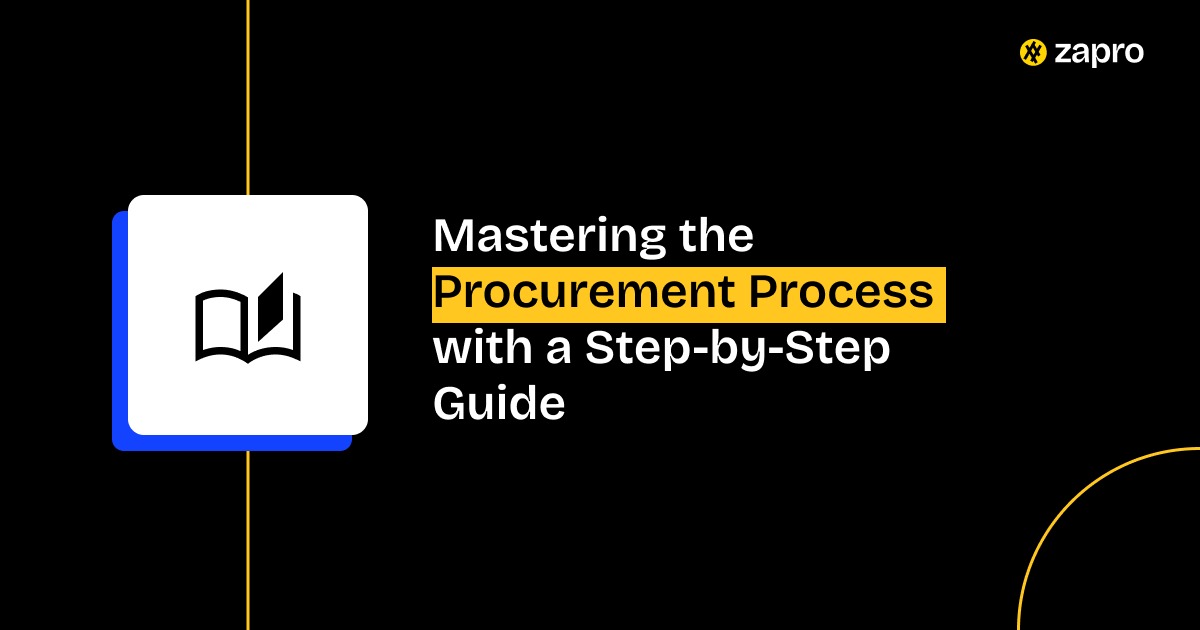
 Healthcare
Healthcare Financial Services
Financial Services Technology
Technology Venture Capitalist
Venture Capitalist Chief Procurement Officer
Chief Procurement Officer Chief Financial Officer
Chief Financial Officer